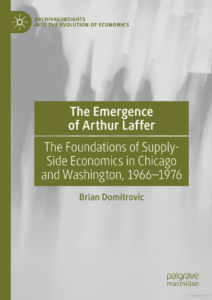The origin of supply-side economics lay in the early academic careers of the movement’s two founders, Arthur Laffer and Robert Mundell, colleagues at the University of Chicago in the late 1960s and early 1970s. The Emergence of Arthur Laffer: The Foundations of Supply-Side Economics in Chicago and Washington, 1966-76 (Palgrave Macmillan, 2021), by Brian Domitrovic, lays out these origins. It chronicles the first ten years of Laffer’s career as an economist, from days as a Stanford graduate student through a stint in the Nixon administration and a professorship at Chicago.
The tabs on this site concerning supply-side history provide documents and evidence from the source base of this book.
On this page are selections of various arguments and explanations advanced in the book. The thesis of The Emergence of Arthur Laffer is that supply-side economics developed out of the paramount macroeconomic academic debate of the late 1960s and 1970s, a debate that had nothing directly to do with taxation. This debate centered on the question: What kind of monetary system should the world have?

